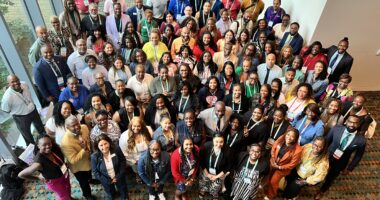Trials of a First-Year Principal: Preparing For the Unknown
After a devastating winter storm on top of a pandemic, one principal shares what worked in crisis leadership as he looks to rebuild his school community.

Texas was recently hit with a winter storm, the likes of which have rarely before been seen in our part of the country. My school district, like many others, shut down for a week as the winter blast caused major electrical and water outages and brought roadways to a snow-packed halt throughout most of the state. This event, layered on top of the ongoing COVID-19 pandemic, became another potential setback in supporting our learners. While we may not know the next critical event on the horizon, we can be prepared when crisis strikes.
Crisis Leadership
Crisis leadership is different than crisis management. Crisis management is acting in the moment to make important decisions on how to triage a fast-developing event. It is important to have protocols to follow during crisis management that will allow for sound decisions while remaining adaptable to multiple scenarios.
I had the pleasure of visiting with our city’s chief of police after our recent winter blast. He explained that because of the extreme temperatures that our community experienced, when changing shifts, the officers would “hot start” their shift, meaning they would keep the engines running to their patrol cars at the end of a shift and the next officer would begin their shift in the same vehicle without ever turning the engine off. This is a great example of adapting to the needs of the organization to be able to effectively serve its purpose.
Crisis leadership is a broader concept than crisis management. It’s a proactive approach to developing capacity within an organization to respond to crisis. Meaningful preparation for the event that we hope never takes place can be the difference in whether an organization is able to overcome crisis. We do some of this well in our schools already. We practice for fire drills, bad weather, and building lockdowns. Other, not so obvious crises are important to consider, as well. Mental health can be a more silent crisis that an individual student or staff member is experiencing. We must take a proactive approach in preparing for these crises just as we do the obvious ones that we drill every month. Crisis leadership saves lives.
Building Redundant Systems of Communication
Following the 9/11 attack on the World Trade Center, major breakdowns in telecommunications were revealed. The repeater systems in the towers were damaged. The cellular and radio signals were jammed while precious minutes slipped by during this tragic crisis. These horrific events, however, taught us the importance of having layers of communication during crisis events.
During crisis on our campuses, it is important to communicate clearly and effectively with all stakeholders—students, staff, and community—and understand how our stakeholders receive their information. During the winter storm, we communicated through email, phone call messaging, Remind, Instagram, Twitter, and Facebook. Through each of these methods of communication, I received at least one response to my messaging. By creating redundant systems of communication, we have the opportunity to reach more people in the way they naturally communicate. Using these systems regularly outside of times of crisis helps to train stakeholders in how communication will be distributed. Also, by building multiple ways of communicating, if one system goes down, we are less likely to create radio silence when information becomes critical.
Model by Doing
When I was in middle school, a tornado swept through my hometown of Lancaster, Texas, leveling a 3-mile swath of the town, including my middle school. Miraculously, it was a holiday from school, and we were at home. This was the first major crisis I can recall, and my most vivid memory is how the community rallied together to support each other. From my perspective, there were no bystanders. There were no rich or poor. There were only people helping people recover from a disaster.
Fast forward to 2017 when Hurricane Harvey flooded the Houston region, including the school district I worked in at the time. I experienced the same community pride in supporting each other through the worst of times. The same has been true of our community through the winter storm crisis in February. Our Abilene community worked together throughout the storm to help neighbors without power, elderly with flooded homes, and homeless citizens looking for refuge. It is in these times, and the small times in between, that students learn how to care for their community, one of the most valuable lessons they will walk away with when they leave our buildings.
Recovering After Crisis
When the school building doors opened back up, we knew there were going to be students and staff members that were still feeling the trauma of the winter storm. For many, the physical and emotional toll will linger for days and weeks to come. For some students, even outside of crisis, school is the place they feel safest and when they are unable to attend, they struggle. Having a support staff ready to serve the varied needs of students and staff was paramount to getting back on track with learning in the days after the storm.
We will not always know the next crisis on the horizon, but we can be certain that there will be a next one. What we do to prepare could make a life or death difference. This winter storm has reminded me to be prepared for the unknown and has strengthened my resolve to help those in need. It has also reminded me to never take for granted when the sun rises in the morning or the warmth of our west Texas community.
Christopher Bailey, Ed.D., is principal of Clack Middle School in the Abilene Independent School District in Texas. Connect with him on Twitter at @stixbailey.




